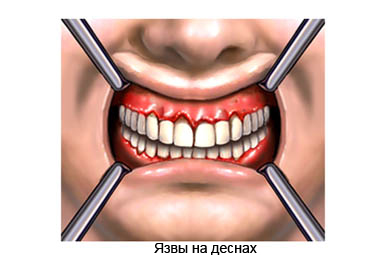Periodontalynaya surgery – Guided tissue regeneration
Description periodontal surgery
Periodontal disease is often due to bacterial plaque and infections around the gum and tooth root. Infection can occur around one or more teeth. In some cases, the damaged gingival tissue. In later stages of the disease, surgery may be performed to regenerate gum tissue. (and even build bone). There are several methods, used to encourage the growth of gum tissue using donor tissue, artificial materials, or tissue from the patient's mouth sky.
Causes of periodontal surgery
This operation is necessary for the:
- Protection of tooth roots, who have been affected, which may lead to bone loss and decay tissue;
- Reduce tooth sensitivity;
- Alignment gum tissue due to recession.

Not all successful transplantation over time. On the success of the operation affect the morbidity and procedure oral care.
Possible complications of periodontal surgery
No operation can not guarantee the absence of risk. Before, how to perform periodontal surgery, you need to know about possible complications, which may include:
- Tooth sensitivity;
- Changes in the appearance of the gums; neravnomernaya line right;
- Bleeding;
- Reaction to sedatives (eg, dizziness, lowering blood pressure, breathlessness);
- Infection;
- Tumor;
- Nausea and vomiting.
Factors, that may increase the risk of complications include:
- Smoking;
- Other health problems, such as diabetes,.
How is periodontal surgery?
Preparation for the procedure
- Tell your dentist about recent changes in your health, taken medicines, allergy;
- Take medicines prescribed by the doctor;
- Tell your dentist about medicines, that you take. You may need to stop taking certain medications on the recommendation of the dentist;
- Sometimes used sedatives, to calm the patient during surgery. If appointed sedative, I need not have, at least six hours before surgery;
- If you use a sedative, You need to arrange a ride home after surgery.
On the day of surgery:
- It is necessary to remove contact lenses;
- Wear comfortable clothing to the procedure.
Anesthesia
Normally used during surgery, local anesthesia, which is introduced near the affected gum area.
Your dentist may also recommend a sedative.
Procedure periodontal surgery
This operation is usually performed on an outpatient basis. If appointed sedative, doctor or nurse will administer the drug intravenously. Cardiac rhythm, blood pressure and respiration are monitored during and after surgery.
Periodontist obezbolivaet porazhennuю province mestnыm anestetikom. Then he will make a small incision in the sky of your mouth and remove some of the surface and / or connective tissue. This is the donor tissue, to be used for transplant. Then, the area of selection will be sewn.
The new fabric will be applied on the damaged gum line and stitched, then on the bandaged area of operation. To stimulate the growth of tissues, sometimes between the gum and tooth placed special mesh.
If not enough donor tissue of the patient's own, fabrics from another person or artificial materials can be used.
How long will the periodontal surgery?
Time, required to complete the surgery depends on the extent of damage to the gums.
Periodontalynaya surgery – Will it hurt?
You may feel mild discomfort, when periodontist numb the affected areas for surgery, but you will not feel pain during surgery. Medications reduce pain and anxiety before, during and after surgery.
Care after periodontal surgery
Home Care
Recovery usually lasts 4-8 weeks. When you return home, Follow these steps:, to ensure the normal recovery:
- Rest as needed;
- Take your medicines as intended. They can be used as light painkillers, Taki how ibuprofen;
- Apply ice on the cheek 20 minutes, to reduce pain and swelling. Wrap the ice in a towel, but put the ice directly on the skin;
- Drink plenty of fluids;
- Eat a small amount of soft or pureed foods;
- Do not smoke, Rinse your mouth, or use toothpicks after meals;
- Apply bandage or gauze to the area of operation in accordance with instructions, that they are absorbed by the blood and saliva;
- Do not exercise for a few days, if indicated doctor;
- Do not drive, If there is a sedative or narcotic painkillers;
- Be sure to follow the instructions of your dentist;
- Visit your dentist or periodontist, if ordered.
Contact your doctor after periodontal surgery
After returning home, you need to see a doctor, If the following symptoms:
- Signs of infection, including fever and chills;
- Redness, edema, increased pain, excessive bleeding, or discharge from the incision site;
- Pain and swelling, which does not pass upon receiving prescribed drugs;
- The dressing or stitches are weakened or bring inconvenience;
- Tissue friability;
- Continued more 48 swelling of hours;
- Other painful symptoms, allergic reactions;
- Nausea and / or vomiting, which do not disappear after taking the prescribed medicines, and maintained for two days after surgery.
